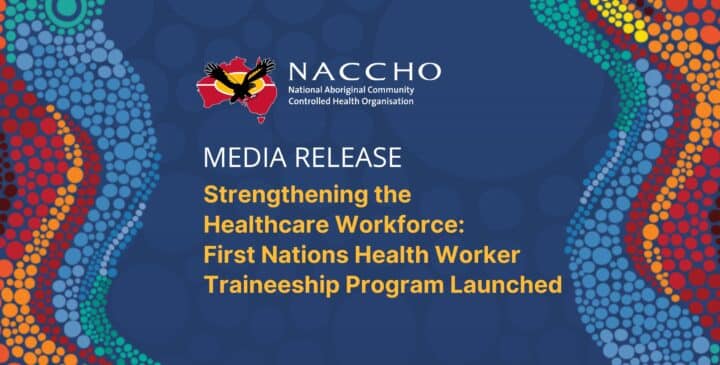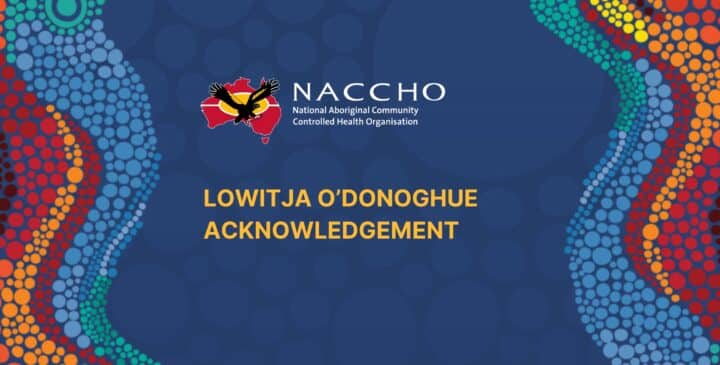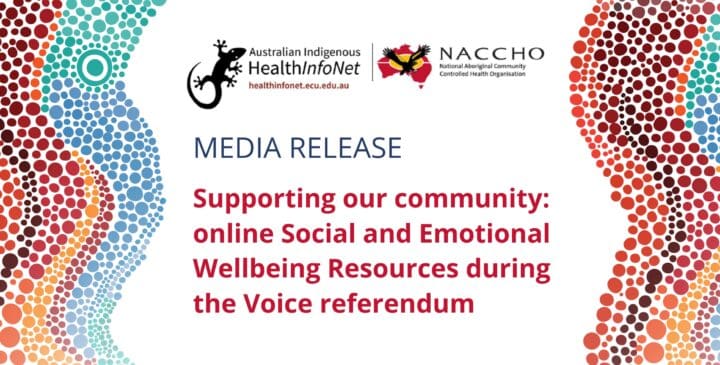

Aboriginal Health needs to be an Election Priority
In light of the election being called on 18 May, the National Aboriginal Community Controlled Health Organisation (NACCHO) urges all candidates, regardless of party or political leanings, to prioritise the health and wellbeing of Aboriginal and Torres Strait Islander communities.
“The health of Indigenous people is not a partisan political issue and it cannot be sidelined any longer,” NACCHO Acting Chair, Donnella Mills said.
“We have developed a set of policy proposals that if adopted, fully funded and implemented, will provide a pathway forward for improvements in Aboriginal and Torres Strait Islander health outcomes,” Ms Mills said.
“We are calling on all political parties to include these proposals in their election platforms and make a real commitment to improving the health of Aboriginal and Torres Strait Islander peoples.”
NACCHO asks politicians to support these key recommendations ahead of the election on 18 May:
- Increase base funding of Aboriginal Community Controlled Health Organisations (ACCHOs)
- Increase the baseline funding for ACCHOs to support the sustainable delivery of high quality, comprehensive primary health care services to Aboriginal and Torres Strait Islander people and communities.
- Work together with NACCHO and its State Affiliates to agree to a new formula for the distribution of comprehensive primary health care funding that is relative to need.
- Increase funding for capital works and infrastructure upgrades
- Increase funding allocated through the Indigenous Australians’ Health Programme for:
- capital works and infrastructure upgrades, and
- Telehealth services.
- Around $500 million is likely to be needed to address unmet needs.
- End rheumatic heart disease in Aboriginal and Torres Strait Islander communities
- Support END RHD’s proposal for $170 million over four years to integrate prevention and control levels within 15 rural and remote communities across the country.
- END RHD is a national contingent of peak bodies committed to reducing the burden of RHD for Aboriginal and Torres Strait Islander peoples in Australia and NACCHO is a co-chair. Rheumatic heart disease is a preventable cause of heart failure, death and disability that is the single biggest cause of disparity in cardiovascular disease burden between Aboriginal and Torres Strait Islander peoples and other Australians.
- Address Aboriginal and Torres Strait Islander youth suicide rates
- Provide $50 million over four years to ACCHOs to address the national crisis in Aboriginal and Torres Strait Islander youth suicide in vulnerable communities:
- Fund new Aboriginal support staff to provide immediate assistance to children and young people at risk of self-harm and improved case management;
- Fund regionally based multi-disciplinary teams, comprising paediatricians, child psychologists, social workers, mental health nurses and Aboriginal health practitioners who are culturally safe and respectful, to ensure ready access to professional assistance; and
- Provide accredited training to ACCHOs to upskill in areas of mental health, childhood development, youth services, environment health, health and wellbeing screening and service delivery.
- Improve Aboriginal and Torres Strait Islander housing and community infrastructure
- Expand the funding and timeframe of the current National Partnership on Remote Housing to match at least that of the former National Partnership Agreement on Remote Indigenous Housing.
- Establish and fund a program that supports low cost social housing and healthy living environments in urban, regional and remote Aboriginal and Torres Strait Islander communities.
- Allocate Indigenous specific health funding to Aboriginal Community Controlled Health Organisations
- Transfer the funding for Indigenous specific programs from Primary Health Networks to ACCHOs.
- Primary Health Networks assign ACCHOs as preferred providers for other Australian Government funded services for Aboriginal and Torres Strait Islander peoples unless it can be shown that alternative arrangements can produce better outcomes in quality of care and access to services.
- Expand the range and number of MBS payments for Aboriginal and Torres Strait Islander workforce
- Provide access to an increased range and number of Medicare items for Aboriginal health workers, Aboriginal health practitioners and allied health workers.
- Improve the Indigenous Pharmacy Programs
- Expand the authority to write Close the Gap scripts for all prescribers.
- Simplify the Close the Gap registration process and expand who may register clients.
- Link medicines subsidy to individual clients and not practices through a national identifier.
- Improve how remote clients can receive fully subsidised medicines in non-remote areas.
- Integrate the QUMAX and s100 Support programs into one unified program.
- Fund Aboriginal and Torres Strait Islander Community Controlled Health Organisations to deliver dental services
- Establish a fund to support ACCHOs deliver culturally safe dental services to Aboriginal and Torres Strait Islander peoples.
- Allocate Indigenous dental health funding to cover costs associated with staffing and infrastructure requirements.
- Aboriginal health workforce
- Increase support for Aboriginal and Torres Strait Islander health workforce and increase support for workforce for the ACCHO sector which includes the non-Indigenous health professionals on which ACCHOs rely.
- Develop an Aboriginal Employment Strategy for the ACCHO sector .
These requests are made in the knowledge that an appropriately resourced Aboriginal Community Controlled Health sector represents an evidence-based, cost-effective and efficient solution for Closing the Gap in health outcomes.
“Aboriginal people need to be at the centre of Aboriginal health,” Ms Mills said.
“The gap won’t close without ACCHOs acting to close it. Politicians must commit to making it a campaign priority to ensure Aboriginal and Torres Strait Islander health policies are inclusive of the Indigenous sector, its representatives and Indigenous people.”
For more information about our Election goals, visit: www.naccho.org.au/VoteACCHO
NACCHO is the national peak body representing 145 Aboriginal Community Controlled Health Organisations across the country on Aboriginal health and wellbeing issues.
For Media enquiries contact Kari Browne on +61 455 415 552 or kari@fiftyacres.com

